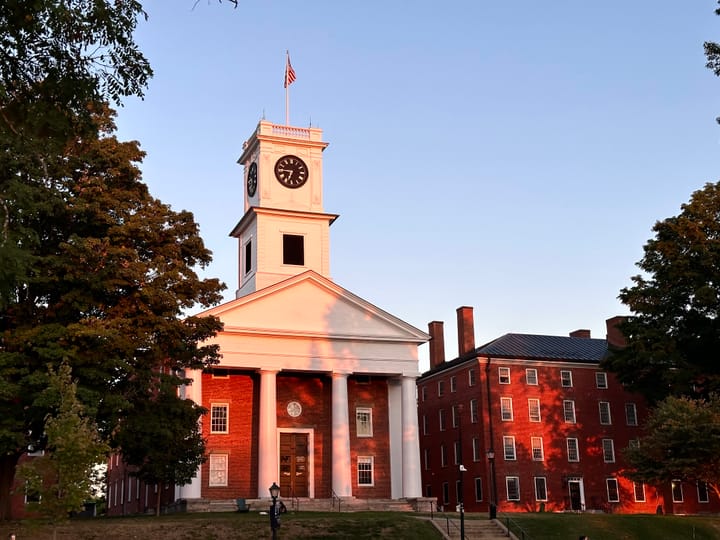Panelists Discuss Mid-East Peace Process
“I was impressed by the wide knowledge of the audience and their willingness to discuss and consider serious changes in the status quo,” said Five College Professor of Peace and World Security Studies Michael Klare, a professor at Hampshire College.
Despite differences of opinion, panelists Tayeb El-Hibri and David Mednicoff of the University of Massachusetts, and Professor of History Gordon Levin of the College, all favored a peace agreement. They agreed that no treaty would be feasible without provisions for a state of Palestine and a plan for control of Jerusalem. “You’re not getting a controversial view, just shades of nuance,” said Mednicoff.
Klare, the panel’s organizer, confessed to a “slight embarrassment” over the discussion’s title, which refers to a Palestinian state that does not actually exist. “It was planned over the summer, when there was much speculation that Palestine would declare statehood on September 13,” said Klare.
El-Hibri had “no immediate answer about Palestinian statehood.” He contrasted the recently ended Israeli-Palestinian peace talks with the Camp David Accords, noting an “unevenness” between the two.
Because Israel is a state and Palestine is not, El-Hibri said, Prime Minister Yasser Arafat has been compelled to agree to many of Israel’s terms. The American media, El-Hibri added, has been mostly ignoring Arafat’s concessions, which include giving up compensation for refugees, demilitarizing a Palestinian state and promising not to make international treaties without Israeli approval. Arafat agreed to these terms hoping to get Jerusalem; without it, his people would view any treaty as a “surrender,” El-Hibri said.
Like his fellow panelists, El-Hibri was optimistic about Palestinian statehood because of the progress made by Barak and Arafat. But, when the Knesset, Israel’s parliament, reconvenes, Barak will probably be voted out of office, according to El-Hibri. Panelists worried that a new Israeli government, hostile to the idea of peace, will not be interested in signing any treaties.
“Negotiations, being held hostage to internal Israeli politics,” are hurting the greater Arab world, said El-Hibri, who described the situation as a “callous international and American-led hostility to Arabs in the region.” But, El-Hibri said that he believed a Palestinian state would do much to strengthen ties between Israel and the rest of the Middle East.
Levin, described prospects for an agreement between Israel and Palestine as “hanging by a thread” and cited Jerusalem as the deal breaker, but worried that Barak, who “broke the taboo over Jerusalem,” would not remain in office long enough to reach an agreement with Arafat.
No mutually agreeable solution to the Jerusalem question has been formally proposed but, according to Levin, one exists.
“The solution has been clear for years, but it has been hidden by the right,” said Levin. “Let what is Jewish remain Israeli and let what is Arab remain Arab.”
Jerusalem would be the capital of two states, Palestine and Israel, Levin said. The Palestinian state would control the predominantly Palestinian neighborhoods, the Dome of the Rock, and Al-Aqsa (the third holiest mosque in Islam), while Israel would retain the predominantly Jewish neighborhoods and the Western Wall.
At present, there is no unity in Jerusalem, Levin said, but, by dividing sovereignty, the city could become united in commerce and trade. Palestinians would benefit by getting part of Jerusalem, and Israel would be looked upon more favorably by its Arab neighbors. “It’s important not to always be in conflict with the Islamic world,” Levin said.
Mednicoff based his presentation around optimistic and pessimistic clichés.
“A rolling stone gathers no moss,” said Mednicoff, who described both parties as willing to continue negotiating any issue. He was optimistic that Arab leaders will not oppose an Israeli-Palestinian agreement.
Klare described the panelists’ views as “more similar than I expected,” but attributed this to “the moment in time, where all sides are coming closer.”
Catherine Jun ’01E said she enjoyed the presentation’s honesty. “I think academia tends to give the most complex view of the Middle East peace process, while the media simplifies everything,” she said. “All three panelists realized there were sticking points Israel and Palestine had to come to a consensus on. Not just politically and territorially, but psychologically, touching on issues of dignity for the Palestinians.”
This series is being sponsored by the Five College Program in Peace and World Security Studies and the Committee on Arab Awareness.





Comments ()